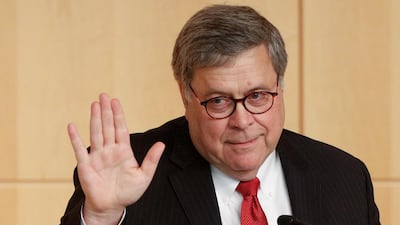US Attorney General William Barr, one of US President Donald Trump’s staunchest allies, is resigning amid lingering tension over the president's claims of voter fraud and the investigation into Joe Biden’s son.
Mr Barr went to the White House on Monday, where Mr Trump said he submitted his letter of resignation.
Mr Trump publicly expressed his anger after Mr Barr this month said the Justice Department found no evidence of widespread election fraud that could change the outcome of the elections, which Mr Biden won.
Mr Trump also expressed disapproval that the department did not publicly announce its investigation into Hunter Biden before the election.
Mr Barr in his resignation letter said he updated Mr Trump on the department's "review of voter fraud allegations in the 2020 election and how these allegations will continue to be pursued".
He said that his last day on the job would be December 23.
Mr Trump said deputy attorney general Jeff Rosen, who he called “an outstanding person”, would become acting attorney general.
Mr Barr was considered one of the president's most ardent allies.
Before the election, he had repeatedly raised the notion that mail-in voting could be especially vulnerable to fraud during the coronavirus pandemic as Americans feared going to polls.
But Mr Trump has typically displays a low tolerance for criticism, especially in the public eye, from his allies.
Mr Barr, who was serving a second stint as attorney general, sought to show himself as an independent leader who would not bow to political pressure.
But Democrats repeatedly accused him of acting more like the president’s personal lawyer than the attorney general, and Mr Barr proved to be a largely reliable Trump ally and defender of presidential power.
Before releasing special counsel Robert Mueller's full report on the Russia investigation this year, Mr Barr delivered the results in a manner favourable to Mr Trump, even though the investigator pointedly said he could not exonerate the president of obstruction of justice.
Mr Barr also appointed as special counsel the US attorney who is conducting a criminal investigation into the origins of the FBI inquiry into the 2016 election.
That investigation led to Mr Mueller’s inquiry into possible co-operation between Mr Trump and Russia, after the president’s repeated calls to “investigate the investigators”.
Mr Barr also ordered Justice Department prosecutors to review the handling of the federal investigation into Mr Trump's former national security adviser, Michael Flynn.
He then sought to dismiss the criminal charges against Flynn, who had twice pleaded guilty to lying to the FBI. Mr Trump later pardoned Flynn.
This is not Mr Barr’s first public disagreement with the president. This year, he told ABC News that the president’s tweets about Justice Department cases “make it impossible for me to do my job".

